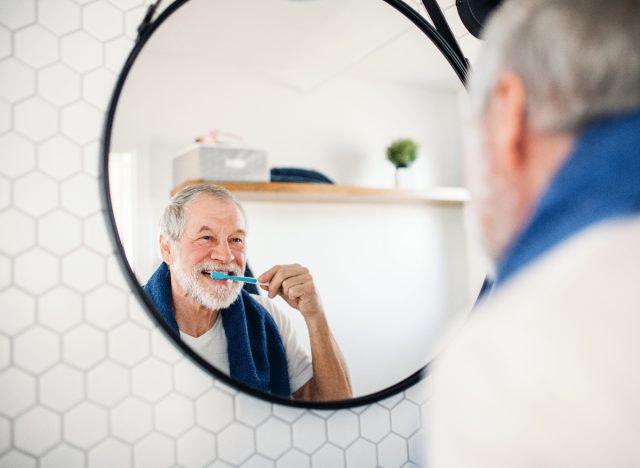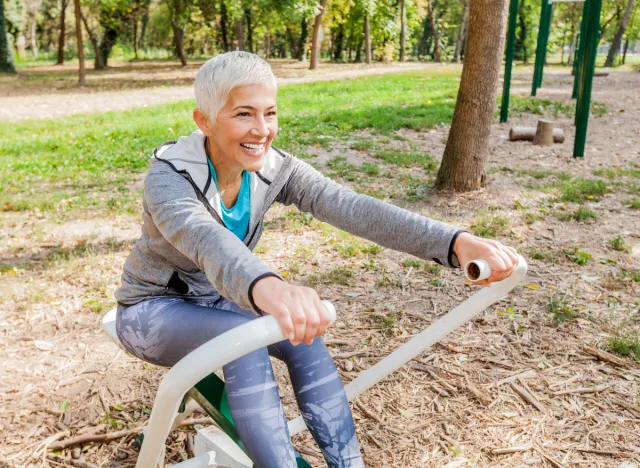
8 Best Brain Exercises To Stay Mentally Sharp From a Neurosurgeon – When you think of exercising, your first thought is probably about sweating it out in the gym—not working out to enhance your cognitive function. But you may be surprised to learn that there are, in fact, ways to exercise your brain! Your brain responds to “novel stimulation,” and if you don’t exercise it, it can atrophy. As people age, it’s common to deteriorate mentally and physically if you don’t keep active, and it’s just as important to keep your mind busy to stay in tip-top shape as it is to establish healthy fitness habits.
“Just like physical exercise is essential for a healthy body, brain exercises play a crucial role in maintaining mental agility and cognitive function as we age. It is postulated that the aging process itself is, to a degree, rooted in the brain,” says Dr. Brett Osborn, DO, FAANS, CSCS, a board-certified neurosurgeon. “In other words, if your brain ages at an accelerated rate, then so does your body. So, treat your brain right, and you’ll slow the progression of aging.”
So are you ready for a very different kind of workout? Keep reading to learn about Dr. Osborn’s brain exercises to stay mentally sharp as you age. He follows them regularly to boost his brain function!

Let’s be honest: You probably don’t correlate your sense of smell to how sharp your brain is. The fact is that olfactory stimulation is an amazing brain exercise.
Dr. Osborn explains, “Your sense of smell is directly integrated into the emotional centers and the memory centers of your brain. So, by stimulating your sense of smell—with novel odors or a mixture thereof—you are not only evoking emotion, but are also stoking the neurologic pathways that build memories and reducing neuroinflammation, the underpinning of neurodegenerative diseases.”
You can easily accomplish this by combining essential oils in an atomizer. A fun exercise to do with a partner is to try to determine what scents you detect with your eyes closed!

An excellent way to challenge your contralateral brain (the right side for most individuals) is to brush your teeth using your non-dominant hand! “This will promote the synthesis of brain-derived neurotrophic factor (BDNF) that facilitates synapse formation (neuron-to-neuron connectivity) not only locally, but throughout the brain,” Dr. Osborn explains.

Put your balance to the test by standing on one foot for just 30 seconds. Do this exercise on each leg for 30 seconds a day.
“This exercises the vestibular (balance) centers of the brain,” Dr. Osborn explains. “Why is this important? One’s ability to do this is inversely correlated to their risk of falling, let alone death. Remember, the leading cause of traumatic brain injury in the senior population—by far—is falls. Take it from a neurosurgeon whose practice is dedicated nearly exclusively to the management of neurosurgical trauma.”

Strength training is beneficial to your health for many reasons, but did you know it can also make your brain stronger?
Dr. Osborn tells us, “Lifting weights ‘lights up’ large motor pathways in the brain and spinal cord. It also promotes the synthesis of BDNF and lowers cortisol (our primary stress hormone), thereby facilitating sleep. And sleep is when memories are formed and the brain undergoes ‘routine maintenance,’ akin to rebooting your computer. So, sleep is critical to optimal brain function.”

Endurance training adds a wealth of goodness to your overall health. It’s not only good for your heart, but it also benefits your brain. Specifically, endurance exercise aids in the preservation of the volume of your hippocampi, your brain’s main memory centers.
According to Dr. Osborn, “To generate a more robust ‘signal’ for the brain, experiment with novel exercises to get your heart rate up. Stop walking on the treadmill day after day—that’s boring—when you can do something more stimulating to the mind. Try rowing or walking outside with light weights in your hands, for example. Just yesterday, I rode my unicycle for 30 minutes, having not been on it for years. Great workout, as there is no ‘freewheel’ and you are pedaling constantly while stimulating your balance centers at the same time.”
Don’t miss: The Man Who Thinks He Can Live Forever

These word games are a wonderful way to challenge your attention, memory, and ability to problem-solve. They also promote abstract thinking. “This stimulates the parietal lobes, where art and music appreciation are similarly located to a great extent,” Dr. Osborn points out. “In a similar context, leisure reading is healthy for the brain. Try to extend your reach here by reading something novel (pun intended). That means fiction or not something related to your line of work or finance.”

Plain and simple? Being in sunlight is healthy for your brain! In fact, Dr. Osborn says it cues your circadian rhythm, aiding your sleep-wake cycle. Sunlight also supports vitamin D synthesis in your body, which helps both your brain and your bones!
“Vitamin D is a potent antioxidant and neuroprotectant. It elevates our moods and accelerates our recovery from illness and other bodily insults,” Dr. Osborn explains. “There’s a reason Florence Nightingale had solariums integrated into hospitals. She knew instinctively that humans derived ‘energy’ from the sun. I encourage every one of my head-injured patients to get out in the sun as soon as possible and usually pull the shades up in their hospital rooms for this very reason. The nurses look at me funny. So what?”

Keeping up with friends and social circles with plans and meaningful conversations help keep your mind working. In fact, socializing is directly linked to a high quality of life and boosted well-being; it can also be effective in preventing depression.
“It should be of no surprise to learn that socialization is integral to the culture in ‘Blue Zone’ regions, therefore,” Dr. Osborn notes. “In such places as Ikaria, Greece and Okinawa, Japan, where there is a disproportionate number of 90-year-olds, elderly citizens socialize late into the evening, dance, and simply enjoy life. Many also live in multigenerational homes to encourage human-to-human interaction. Why? Socialization is part of our humanness. It makes us feel good and is good for our brains as evidenced by the astuteness of many nonagenarians living in the Blue Zones.”









